Trending
Opinion: How will Project 2025 impact game developers?
The Heritage Foundation's manifesto for the possible next administration could do great harm to many, including large portions of the game development community.
"The rent is too damn high in the real world. By George, let's not repeat the same mistakes in the digital one."
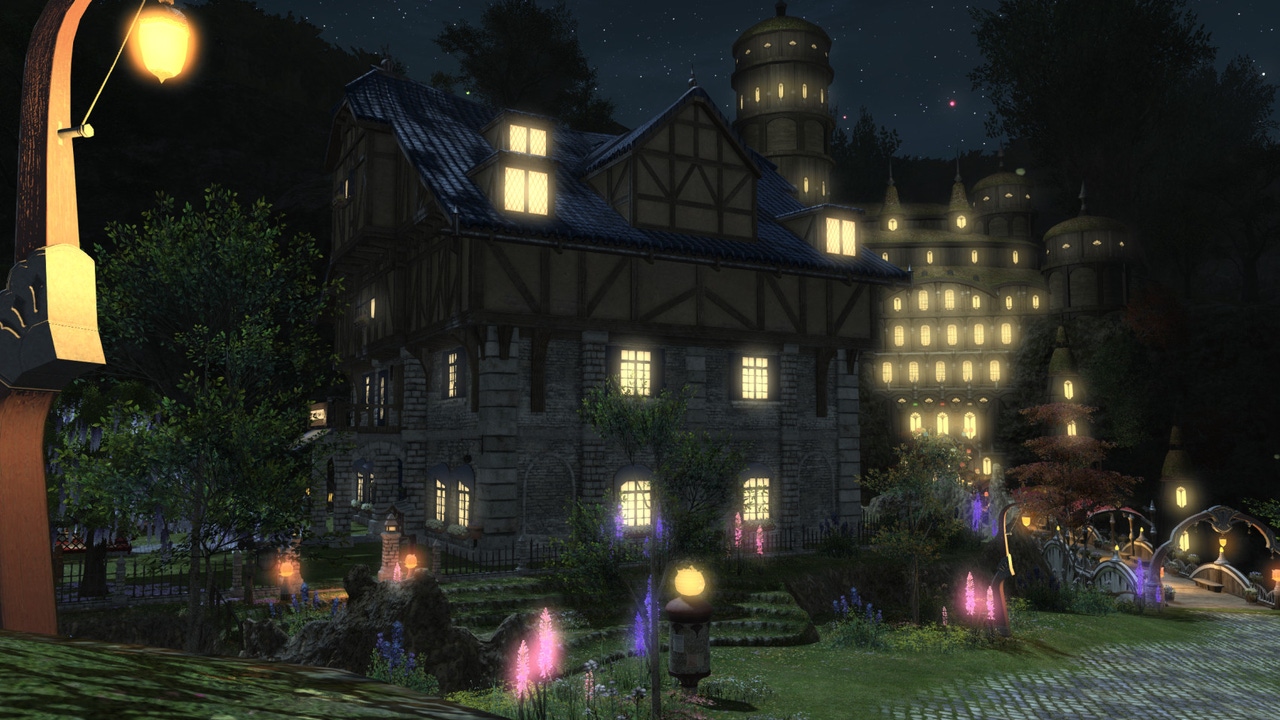
The hot new trend these days is games featuring "digital real estate." I'm concerned these will lead to digital land speculation bubbles that will make players, developers, and investors alike lose stupid amounts of money. If you're developing or investing in a game or app like this and expecting to ride a blistering wave of growth to a multi-billion dollar valuation you'd better take a hard look at the fundamentals before you run smack into a brick wall.
Digital real estate is not actually a new phenomenon, and history consistently shows that when "digital land" sufficiently resembles the economic properties of physical land, we see digital land speculation, digital housing crises, and even full-blown digital recessions. That means a period of exciting growth suddenly grinds to a halt once scalpers corner precious digital property and keep it out of the hands of those who actually want to play the damn game or perform valuable and productive activities for the community.
Take Axie Infinity, for example:
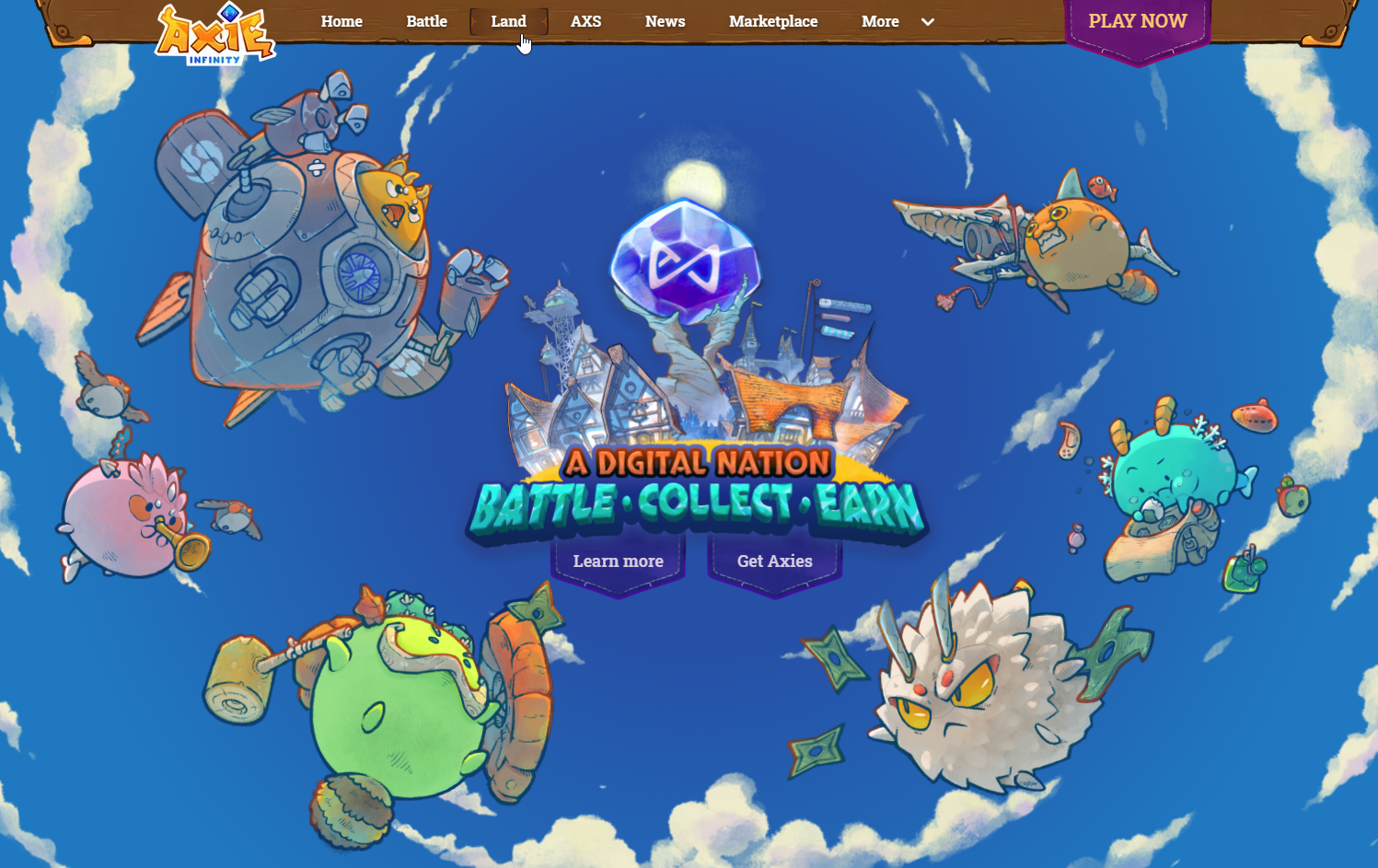
Axie Infinity is "a Pokémon-inspired universe where anyone can earn tokens through skilled gameplay and contributions to the ecosystem. Players can battle, collect, raise, and build a land-based kingdom for their pets." The game in its present state is centered on the buying and trading of non-scarce virtual creatures called "Axies" in order to battle them against each other, but future plans put a heavy focus on buying and selling scarce digital land. Though the game is still in an early phase of development, you can buy land right now:
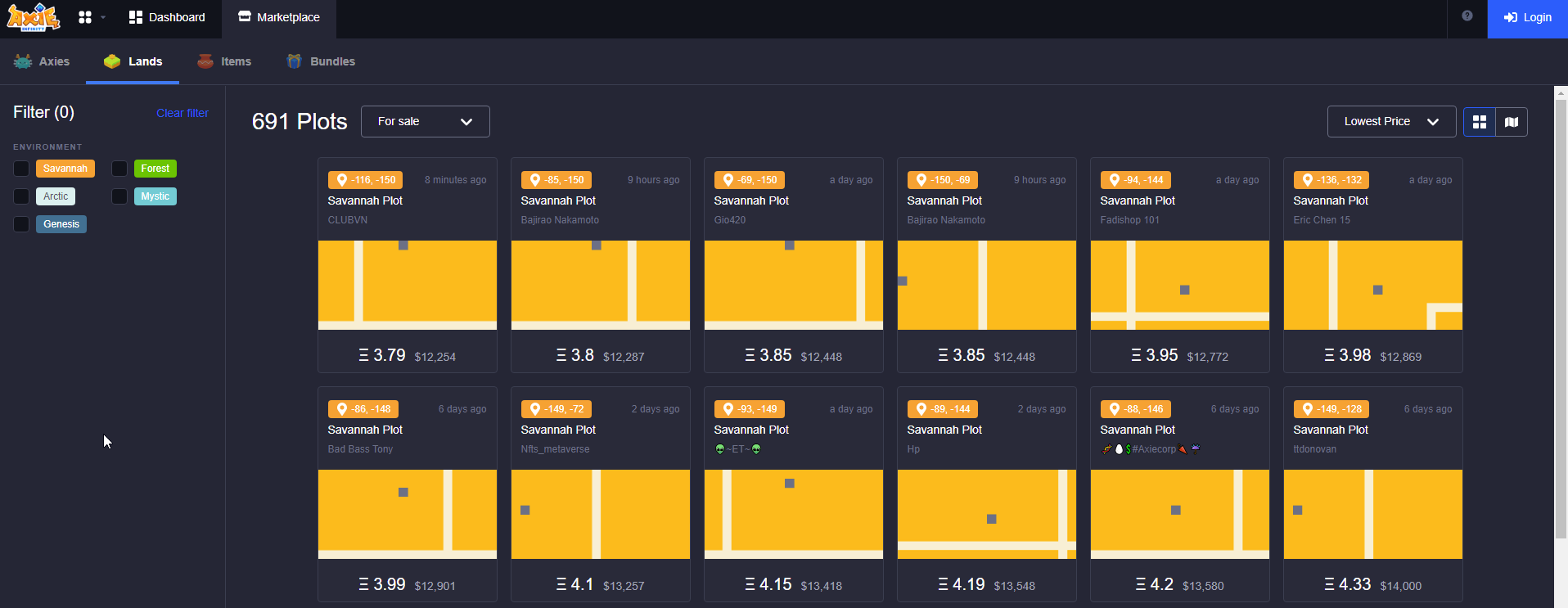
Let's completely leave aside the fact that Axie Infinity is blockchain-based and focus entirely on the real estate angle (see here for my thoughts on crypto games).
Land in Axie confers many in-game benefits, including the right to charge rent which can be cashed out for real-world money. And unlike the game's virtual critters, land is completely fixed in supply. Crucially, a future phase of the game will encourage people to build new interactive experiences, but this activity will only be open to those with access to land.
I can tell you exactly what's going to happen here, because it's what always happens – speculators will buy up all the land and hold it. If there's no cost to holding onto this scarce asset that everybody needs and wants, and this asset will predictably rise in value, speculators will just sit on it and watch the price shoot through the roof and anyone who wants to use land will have to pay out the nose. This will have a negative drag on the game's entire economy, and the speculators will get rich at everyone else's expense. All this talk of emergent and spontaneous user creations built on a beautiful "digital nation" will grind to a halt, crushed by the weight of rent-seeking parasites.
Exactly how bad this will be for Axie in particular depends a lot on what decisions they make in the coming months. But I can say this much – the more important "digital land" is to the game, the worse the crisis will get.
We know this for two reasons – first, it's exactly what happens in the real world economy, and second, we've seen it happen multiple times before in the digital economy. Ultima Online, Final Fantasy XIV, and EVE Online are all prominent examples of virtual worlds with sophisticated internal economies that have all suffered from digital land shortages fueled by scalping and speculation. Two of those games are still suffering from land shortages to this very day, but one of them was able to solve their crisis thanks to a quick-thinking economist who took a page out of the book of the 19th-century populist firebrand Henry George.
As long as there has been digital real estate, there have been digital housing crises, which stem from a shortage of digital land.
I remember playing Ultima Online back in the 1990's and could not find a free patch of land anywhere to place a house, even though I had the money to build one. This grand-daddy of MMOs is still chugging today, so I thought I would look up historical information on the housing shortage I experienced as a teenager, expecting it to have been resolved long ago.
This was the first hit for "Ultima Online Housing Shortage":
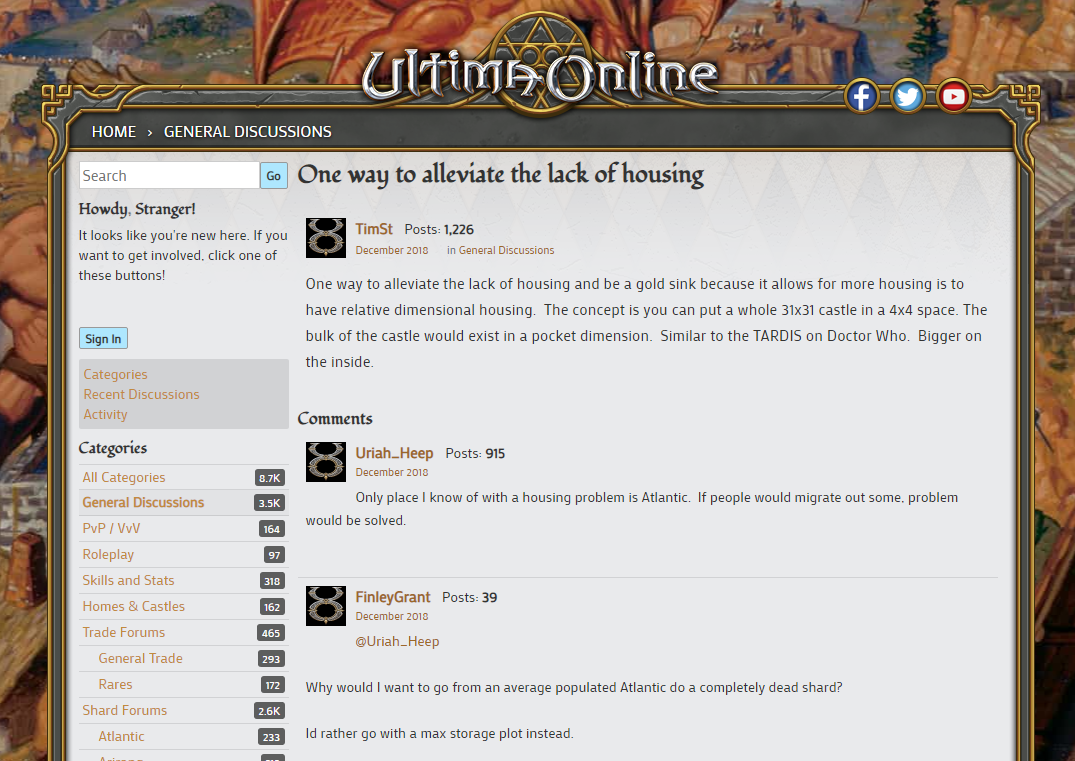
Taken from this post on the official UO forums
The housing crisis was still ongoing as recently as 2018, and to the best of my knowledge is still ongoing.
What's even more striking is that everything in this thread parallels talking points that should be familiar to anyone acquainted with the real-world housing crisis. TimSt's proposed policy– allowing houses to be bigger on the inside than the outside – is the non-Euclidean video game counterpart to up zoning for density, a policy proposed in the real world by so-called YIMBY's to repeal restrictive zoning laws that block multi-family housing, leading to more efficient land use and more housing. Uriah_Heep's suggestion for TimSt to move somewhere less crowded is met with the reply that nobody wants to move to Ultima's equivalent of rural Nebraska.
What makes this all so strange is that digital land doesn't have to be like physical land, in fact you kinda have to go out of your way to do that on purpose.
Real Estate, digital or physical, is composed of two things – land, and improvements. Some examples of improvements are buildings you construct, crops and orchards you plant, and landfill you pour into the seabed to turn wet land into dry.
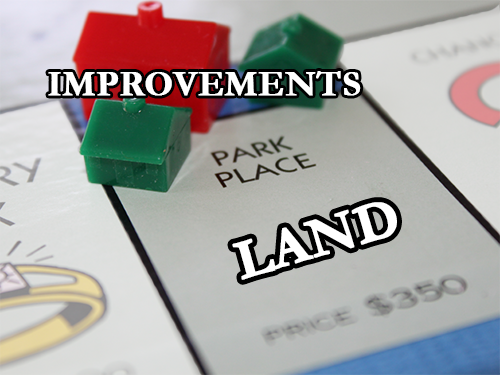
(Modified from source, CC BY 2.0, author: Philip Taylor)
Improvements are a kind of capital, but land is not. The main difference in the physical world being that you can make more capital, but you can't make more land, it's a free gift of nature. It's from this and a few other properties that all the problems stem.
Virtual world creators are free to set the rules however they want, but the more digital land starts to resemble physical land, the worse the damage from digital land speculation becomes.
No physical law stops you from making more digital land. Of course a platform holder can choose to maintain scarcity in land, or any other asset for that matter. Wizards of the Coast could always crank out a million Black Lotuses tomorrow, it's just they've given players every indication they'll never do that, and they don't want to undermine the expectations that underpin their economy. Ultimately the "scarcity" of digital land is predicated entirely on the trust players put in the company to maintain its policies.
And no, blockchain doesn't offer any assurances that more land can't be created unless the app passes the degraded blockchain test. If you can't pass it (and I've yet to see a crypto-backed startup that does), your players are still relying on trust.
There are server costs to consider – fully customizable land isn't something that necessarily scales well. But this just makes digital land expensive to produce more of, in the real world producing more land (by which we really mean "locations") isn't even possible.
The scarcity of digital land is thus always an illusion – an intentional choice constantly being made by the platform holder. But voluntary though it may be, as long as digital scarcity is maintained, it naturally leads to speculation. As the saying goes, "buy land, it's the only thing they're not making more of."
In the real world any real estate agent will tell you three things factor into driving property values – "location, location, location." But locational value depends a lot on the laws of physics. We take for granted that houses aren't bigger on the inside than they are on the outside, and that you can't step out the front door of your mansion on Pluto and instantly arrive at Times Square. If you could, real estate on Times Square would be a lot less expensive.
In the digital realm your world doesn't even have to be Euclidean, and portals and teleportation spells are so common they're almost expected. Fast travel options, instancing, and "pocket dimensions" that are bigger on the inside than the outside allow digital worlds to get around the restrictions that make physical land so valuable – but only if they choose to.
In the physical world everything you do depends on access to land. Whether it's working, eating, sleeping, or pooping, your right to do those things in particular places depends on some landowner (yourself if you're lucky), granting you access. Just trying to sleep on a park bench can easily get you hassled by the police or even arrested.
The digital world doesn't have to be this way. In many virtual worlds it's okay to be digitally "homeless" – there's rarely a huge in-game cost to not having a digital roof over your head, and you can still be healthy, productive, and even wealthy without a virtual place to call home. If you want to go to sleep you just log off.
But for whatever reason many virtual worlds choose to make "digital land" a necessary factor of production. This happens when anything interesting you might want to do requires access to specific locations, whether that's a population center for socializing, a marketplace for trading, the wilderness for resource gathering, or dungeons for questing. The question then becomes whether access to this digital land is in any way exclusive. If all the valuable locations are instanced for or accessible to every player that wants to use them, you'll never have a shortage. But if one player occupying a plot of land means another player can't, it becomes more like physical land.
Even land that confers optional "nice to have" in-game benefits can be sufficient to cause a land crisis, so you can only imagine how bad it can get when core game features are locked behind land ownership.
Given that digital land doesn't have to be like physical land except by deliberate choice, it's striking to see digital land shortages play out in ways that strongly echo what we see in the real world. From my knowledge of real world economics and my perusal of the 30-year long history of digital land speculation, I expect shortages to occur wherever digital land is:
scarce
necessary and/or confers a benefit
gains value from proximity to population centers and/or "public works"
In other words, the more landy your land is, the worse your land crisis will be.
The surest signs of a land crisis are a permanent class of landed gentry, rampant land speculation, sky-high prices, and naked rent-seeking.
All of this will cramp your user growth proportionately to how central land is to your game. That's been the only saving grace for most MMOs – a house is "nice to have," so as annoying as it is to not get one, you can still have a lot of fun in the rest of the game. This gives MMO developers the slack to keep muddling through treating the symptoms of the problem without ever excising the root cause.
I'm far more concerned for games where digital real estate is the primary reason to play, and where landownership is the basis for doing anything at all. Especially when there's real money involved. Ultima and FFXIV never solved their crises but manage to keep going strong today because it's okay if an optional part of the game just totally sucks. For EVE, however, the crisis was existential because control of land was central to the entire experience. Games like Axie must learn the lessons of history before it's too late.
Ultima Online (UO) first launched in 1997. Though hardly the first MMO, it was a genre-defining title. It notably featured a housing system: save up enough resources for a blueprint of the house you want – anything from a small shack to a magnificent castle – then find a free plot of land somewhere, and place it down. It didn't take long for nearly every free space to get used up.
If you didn't visit your house often enough it would be automatically deleted to make room for others, but enterprising land speculators were undeterred. Holding free plots with a building – any building – was a good investment because the price players were willing to pay to gain access to the land far exceeded the costs of capturing and holding it.
So why didn't players just move to a less populated server, one that wasn't already filled up with houses? It's a good question – the less popular servers had more free space; but they also had far less players, which made the experience less fun. Besides, back then you couldn't transfer your character across servers, so moving also meant abandoning not only all of your friends, but also all of your experience, skills, and equipment. Populated land was and is the most valuable land.
There's a parallel here with the real world – the total land value of the contiguous 48 United States (7.6 million square kilometers) was estimated at about $23 trillion. But the estimated value of all urban land (a mere 198 thousand square kilometers) was estimated at around $19 trillion. Yes, that's two different researchers using two different methodologies in two different years, but the napkin math checks out: urban land is where the vast majority of the value is, because that's where the people are.
And if you don't believe me, I have a vacant lot in Gerlach, Nevada to sell you. But don't worry, it's only $236/acre; on the other hand a 2,300 square foot empty lot in downtown San Francisco (about 5.3% of an Acre) will cost you a cool $2 million, last I checked:

This is due in part to what economists call an agglomeration effect – living in the middle of a thriving civilization with easy access to a butcher, a baker, and a candlestick maker is a lot more valuable than living alone in the middle of the forest, even if your house is the same. What's true for Earth is true for Ultima.
Ultima Online had some other particulars that dictated the shape of its housing crisis. Since it's been a long time since I last played, I interviewed veteran UO player Maelyn Dean (who some of you might know as the creator of Real Life Comics). I reached out to UO lead designer Raph Koster as well but he was a little too busy at print time so I'll follow up with edits whenever I can get some quotes from him.
UO suffered a bit from being an early MMO designed without the benefit of modern hindsight. Lasting consequences came not just from big decisions but also trivial ones. Mae recounts how even a good decade into the game's life, every single rock, bush, and tree was still an indelible part of the map that couldn't be moved for love or money. This created a lot of unnecessary dead space where people can't place houses, making usable land particularly scarce. There was also no instancing of dungeons, housing, or cities, or any other fancy non-euclidean tricks to make the supply of land greater than it appeared.
Also, at least in the early years, advanced transportation was limited. Mae reminded me that long-distance teleportation was a privilege reserved strictly for Mages (or players with access to scrolls prepared by mages), and even then required the investment of spell reagents and runes. Crucially, you couldn't just teleport anywhere you wanted at will, you first had to physically hoof it over to the desired location at least once to mark the rune. There were also horses and boats, but those could be lost, which just left moon-gates. These were mysterious astrological portals whose destinations were tied to the complex motions of the world's twin moons, and located far away from natural points of interest.
Three factors combined to make land particularly valuable in UO – first, land was scarce, as new landmasses were added to the world map extremely rarely. Second, land was useful because houses conferred an oasis of safety in a dangerous world, as well as a convenient alternative to banks for storage, and opportunities for socialization and role-playing. Third, land was valuable, and this value increased based on its proximity to major cities, dungeons, or deposits of natural resources.
Unfortunately, if you wanted to ever actually have a house you had to pay a speculator on the black market. Mae recounted buying an "absolutely primo" UO house right next to the city of Vesper on eBay for $30 USD (two month's worth of subscription fees) which greatly increased her enjoyment of the game.
Next, let's look at Final Fantasy XIV, which is wracked by many of the same problems.
Google "Final Fantasy XIV housing shortage" and you will find a continuous stream of articles dating back years. I have never played the game myself, so I interviewed veteran FFXIV players Joe Radak and Xalavier Nelson to fill me in on the details. Any errors below are entirely my own.
FFXIV houses can confer a few "hard" benefits, but only if you first acquire special items. One lets you use your house as a convenient warp location, and another allows you to access your "retainers" to store items. Ultimately these "hard" benefits for housing are fairly weak (you can use retainers outside the housing system, for instance). Even the items you can truly "store" in a house are housing-specific, and will be lost along with the house if you give up the title.
The main appeal of housing is thus in "soft" benefits like status, aesthetics, role-playing, and self expression. The last point is particularly key because Joe tells me that a core design pillar of FFXIV, perhaps more than most other MMOs, is about enabling and celebrating player self-expression.
There are "apartments" in FFXIV, but they're in low demand and not a target for speculators (and don't seem to get used by players that much, either). The reason for this is that unlike in the real world, you don't have a fundamental need for a mere roof over your head; if you want to go to sleep you just log off. Further, basic amenities are provided by free public inn-rooms which according to Joe are fully furnished instanced areas where you can go to change your hair style, access your retainers/inventory, and customize the look of your armor and clothes. They're basically infinitely available single-occupancy public restrooms. Apartments don't have much to offer in terms of features that you can't already get elsewhere, and their affordances for self-expression and artistry are minimal. Land for houses is where all the demand is, but chronic supply constraints make speculation endemic.
Whereas in UO any open space in the wilderness is a potential house plot, in FFXIV land for housing is strictly limited to specific zones separate from the main game called "housing districts," tied to specific cities that you warp to from the city center. You can think of them as hyper-dimensional suburbs. Each housing district has a different architectural style, and the most popular is Shirogane, which has a distinct Asian theme. It used to be mandatory that all player houses in a district would conform to the local style (can you say "Digital Home Owner's Association?"), but this requirement has since been relaxed. Nevertheless, the differences between districts creates variations in desirability, which is reflected in the black market prices for housing.
Mae isn't a fan of FFXIV's housing scheme, because it pushes housing into its own corner detached from the main game. She acknowledges that the developers likely did this so they can deal with housing without having to worry about its effects on the rest of the game, but feels it ultimately impoverishes the experience by making player houses less "real" and have less connection to the role playing and daily drama of the main game. The biggest problem with FFXIV's hyper-dimensional suburbs, however, is that it has somehow achieved the worst of both worlds – a virtual bedroom district that doesn't interact with the rest of the game, and a limited supply of land that has led to rampant housing speculation, sky-high prices, and a black market for land.
As Joe explains, every housing district typically stays full. The moment anything comes on the market it is taken within seconds. Players will camp for half a day or more just to get the opportunity to claim a piece of land.
After a vacant house gets cleared, it goes on the market. But this doesn't happen right away. Instead a hidden timer with an unknown amount of time starts ticking down. This could be many hours. While the timer is going, nobody is allowed to purchase the empty land. As you can imagine, this leads to all manner of nasty tricks, macro'ed accounts, bots, the whole nine yards.
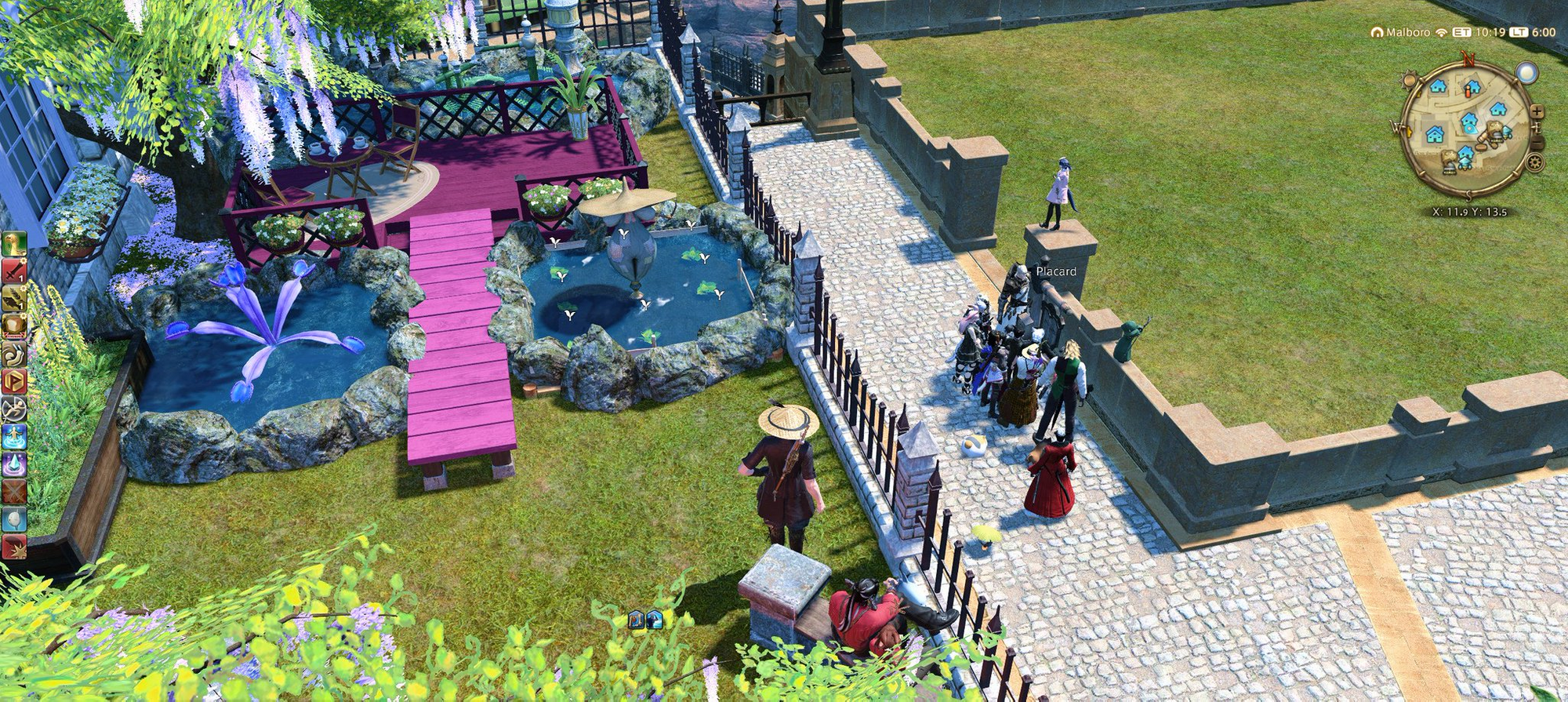
A group of botted land speculators frantically camping a fresh land plot in FFXIV for hours on end
However – if you already own a house, you have a way to skip the queue. Current homeowners have the option of moving their house from one lot to another, and can do so even while the land timer is still counting down.
Joe recalls how he and his friends saved up a lot of money, logged off in just the right locations, then got up at 5 a.m. just as a brand new housing district rolled out. They perfectly timed the land rush and with incredible luck, managed to snag a beach front medium house in Shirogane - everything else was gone in 40 minutes, and only because the servers were under strain; on larger servers it was all gone in 10 minutes. As he and his friends moved on to other Free Companies or other games, they did the bare minimum maintenance check-ins to keep the house from being deleted for several years. In that time, Joe was able to get a small house. He was able, with permission from his friends, to relinquish their medium sized, beach front house and relocated his small house to the vacant medium plot in seconds. Since the size of your house is tied to the size of the land, Joe got a free upgrade to a medium house! He still had to pay for the land, but he didn't have to wait in line, and he didn't have to pay for the house upgrade. In this way FFXIV's land policy explicitly favors existing landowners.
As Joe puts it, "The system is REALLY bad for folks who don't already have housing, but is actually ok for those who do." He further tells me that rich players will collect large numbers of houses through various shenanigans, and points me to a Kotaku article from 2017 about two players who together cornered an entire housing ward. "This is still prevalent." he says.
Joe says the developers are planning on changing the system to a straight up lottery where you file your interest in a plot of land and a winner is randomly chosen from all interested parties, but you no longer have to physically camp out and click-farm it. This makes land acquisition less of a pain, but does nothing to alleviate the fundamental problem of scarcity; land scalpers will surely find creative ways to multiply their share of lottery tickets.
Joe was one of the lucky ones to score a nice house. Here's the view:
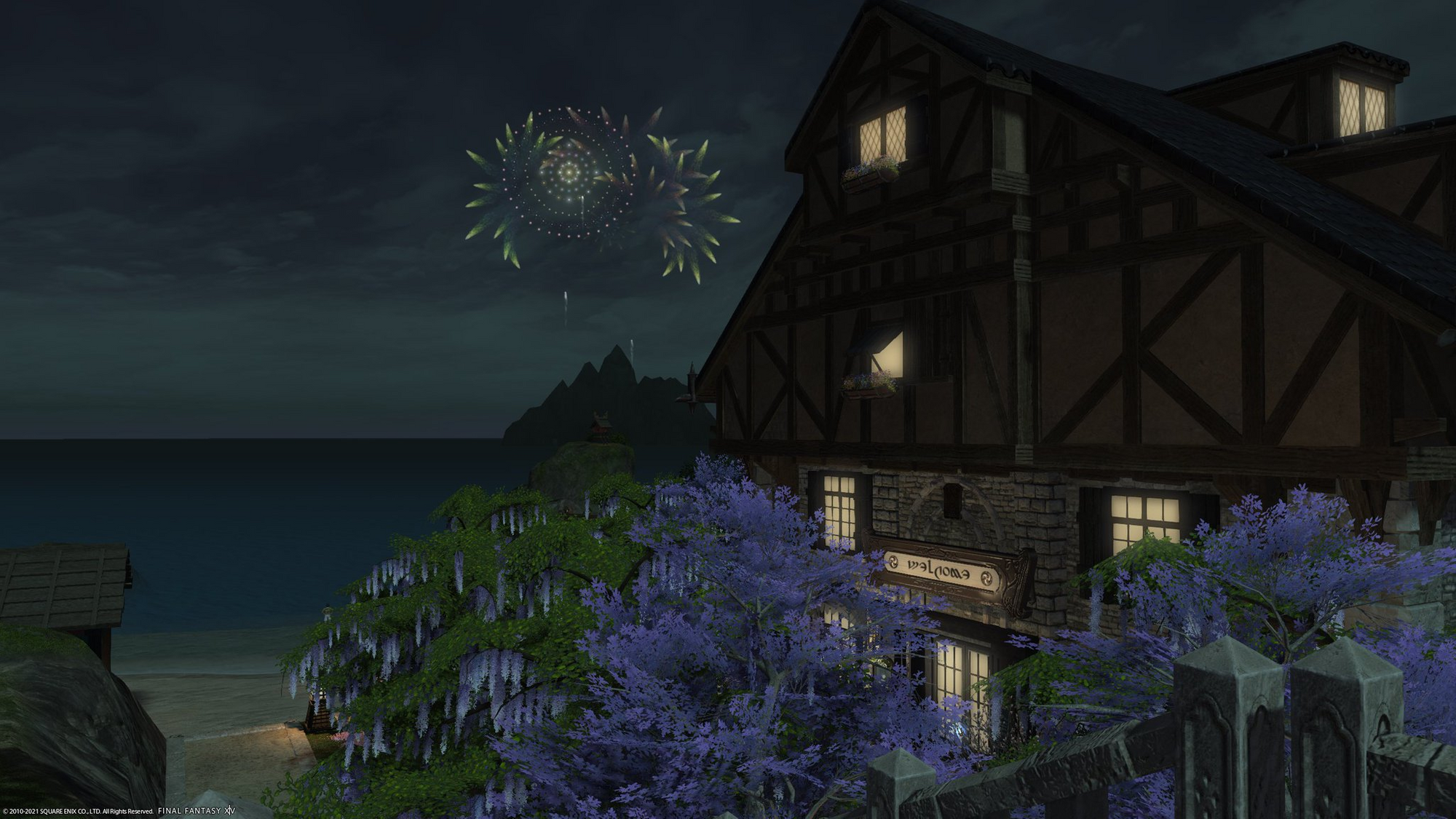
Joe's prized beachfront property
Note the waterfront location and fireworks display.
Both of these add to the value of his property, and they're both right out of a real estate textbook. The water is a scarce natural feature that people bid for proximity to, and the fireworks display is a classic example of a non-rival, non-excludable public good. The first has the tendency to increase the value of properties near it, and the second, per Nobel laureate Joe Stiglitz's Henry George theorem, has a tendency to increase land values and rents throughout the area.
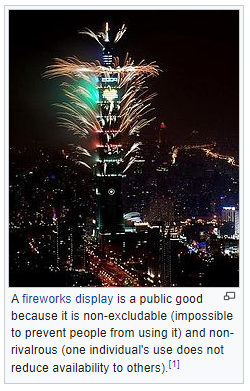
If you look up "Public Good" on wikipedia, you'll see a picture of a fireworks display
In the digital world, there isn't much of a difference between "natural features" and "government works" – the developer is the government, and the entire world is artificial. But I should point out that the waterfront in particular has more than just aesthetic value, because you can use it for fishing! This increases the value whether you plan on doing any fishing or not, because someone else still wants to.
But wait, there's more!
Houses aren't just a status symbol or a place to park your stuff in FFXIV. There's an entire community of role players who take themselves very seriously and use housing as settings for their craft. There's even entire theatre companies and interior designers. But right now the only ones who are allowed to participate in these artistic acts of self-expression are players with access to housing.
The developers' response to this years-long housing crisis has been to slowly create more land and make tiny tweaks to their policy. When housing was first introduced there were no maintenance fees, and no auto-degrading houses. They added degradation to clear out vacant houses, but to this day there is still no monetary upkeep cost to holding real estate out of use.
Meanwhile, a new housing district is slated to appear in early 2022 in the upcoming expansion as part of the Ishgardian Restoration. For several consecutive updates there's been server-wide goals and activities for players to band together to rebuild a "devastated" housing district, with players completing quests and contributing crafting materials, all working together to bring a new area back to life. The new district will have a giant central plaza and a performance stage, which Joe predicts will make it one of the most in demand housing districts ever. But without significant policy changes, nothing will stop all the land from being gobbled up in minutes.
At the same time, Xalavier points out the developers are working on something else that could serve to reduce some pressure on housing prices – an upcoming feature called "Island Sanctuary." Details are scarce, but some are comparing it to Animal Crossing, which director Naoki Yoshida remains coy about:
Think of it as a mode that allows you to create your own space without the need to fulfill requirements set up by others or competing with other players. You can tend to your animals and crops, expand the territory on your island, and let your minions roam free. As such, it’s a mode through which you can enjoy the slow life.
It sounds like "Island Sanctuary" will be something like per-player instanced housing where there's more than enough land for everyone, but it's not clear to what extent you'll be able to share this experience with other players. To the extent that artistic players just want a space to be creative, this can scratch that itch and take pressure off the housing districts. This very sensible decision would be equivalent to just creating infinite land. But for any activity that requires the participation of others, the pressure remains. Island Sanctuary is also unlikely to satisfy players like Mae who want a more durable and tangible connection that lets players actively participate in the "real" game world.
As we've seen from Ultima Online and Final Fantasy XIV, anytime you have a game with "digital land" that is 1) scarce in supply, 2) valuable or necessary, and 3) gains value from proximity to population and economic activity, you are setting yourself up for a digital land bubble and speculation crisis.
Now let's look at the game that famously solved its crisis, way back in 2003.
Economist Ramin Shokrizade explains the whole thing in his 2013 Gamasutra article, "How I Used EVE Online to Predict the Great Recession." Let me just quote the opening paragraphs at length:
"The EVE Online Real Estate Crisis
Back in 2003 when I was helping CCP with their new economy in EVE Online, the biggest problem with their design was that the factories that were central to the player based economy were too cheap to buy and maintain. Since the game was released in the UK a day earlier than in the USA, by the time I was allowed to log into the retail version of the game all of the prime factories had been grabbed. This forced me to race to Minmatar space, where the ships were generally held in lower esteem by beta testers.
There I managed to buy the factories in a key star hub and set up shop. I produced the first Mammoths (a massive transport ship critical to trade) in the game, and also the first Minmatar battleships. I would have loved to expand my production but within days of the retail launch all factories had been bought up and idled by speculators who were charging $300 to $400 per factory, without any way of knowing if they really owned the factory or not.
One week after the launch of EVE I handed a report to Reynir Hardarson explaining, among other things, how this weakness in the economic design threatened their game and how to solve it. My solution was to greatly raise the rents on these factories so that only those that were actually actively running them would want to hold them. The idea was to create a “hot potato” effect where no rational person would want these factories unless they were doing a lot of output with them.
While it took several months to implement the fix, once it was in it worked perfectly by causing the speculators to abandon their stranglehold on the economy. In the meantime a handful of players who did have factories (myself included) got exceedingly rich. Thus the effect of this speculation was increased wealth stratification, reduced economic competition, increased consumer goods prices, and crazy real estate inflation."
Ramin suggested that the "government" of EVE should simply impose a "use it or lose it" fee as an unavoidable cost to holding factories, which had strong land-like properties (scarce, necessary for production, gain value from location). This fee had to be high enough to take all the profit out of speculation. This is effectively a "land tax," and despite what your experience with other taxes might have taught you, land taxes are special in that (all other interventions held equal) they have the tendency to lower land prices by driving speculators out of the market.
I asked Ramin about this in the comments and it quickly became clear that he had independently re-derived Henry George's famous Land Value Tax (or something close to it) from first principles, despite having no prior knowledge of that particular philosophy. To be clear, I say this as a credit to Ramin!
If you're interested in learning more about that economic philosophy, variously known as "Georgism" or "Geoism", I wrote a book review of the principal text Progress & Poverty as an entry for the Astral Codex Ten book review contest, which won first place.
The Land Value Tax – also known as a "site value tax" or "location tax" – is not to be confused with a property tax – "property" being the land and the buildings, and thus a tax on the value of both added together. A land value tax is just a tax on the land, the scarce underlying resource that nobody can make, but that everybody needs. And it's not a flat tax based on how many acres of land you own either, it's a tax on the value of that land. So a 2% land value tax is only going to cost you $4.72/year for that acre in Gerlach, Nevada, but it will cost you $39,800/year to squat on that 2,300 sqft. parking lot in the heart of San Fran.
So what's a landowner's natural incentive when a high enough land value tax is in effect? Well, they better sell the land, or build something useful on it already. Forcing speculators to bring land to market and driving out bids from speculators who have no interest in actually using the land themselves both drive down the price of land. As the value goes down, so will the amount taken in land value tax. But if speculators try to bid up the price of land again, the tax rises proportionately, automatically deflating the bubble.
But won't speculators just pass on the land tax, making the prices go up even further? Empirical evidence has consistently shown that it won't. We have Ramin's example from the digital world, but it's been well established in the physical world as well, with the latest proof from a Danish paper published in 2017 detailing a stunning and well-controlled natural experiment. It has been long held by Georgists and non-Georgists alike that Land Value Tax, unlike Sales Tax and Income Tax, has no deadweight loss, and experimental evidence continues to confirm this.
EVE is a lot more complicated now, and I haven't checked back in to see if Ramin's reforms have stuck around – so to be clear I'm not ready to claim there have been no land shortages in EVE ever since. I'm just reiterating his claims about how he solved the particular digital land shortage the game suffered from in 2003.
If you want to try using a digital Land Value Tax to solve your digital housing crisis, by all means ring me up and I'll be more than glad to help you implement it and simultaneously introduce you to many fine economists with a firm handle on this problem. The broad strokes are simple to grasp, but the particulars depend a lot on each game's specific implementation and social conditions.
But we must always remember digital land is not physical land, so we can often solve this problem by other means. It's just important to make sure we tackle the root problem rather than endlessly treating symptoms with kludges.
Never forget you can just make more land. You have a digital world free from physical constraints, just print land like dollar bills, yo. If your problem is caused by a scarce resource, just make it less scarce, problem solved. This tackles the problem from the supply side. Unless of course there are significant server costs to maintaining land, in which case you need to ask yourself if you as the developer are "selling" land significantly below its cost to maintain. Players might be more amenable to even a real world money land tax as a maintenance cost in this case – they already pay in real world money for extra retainers in FFXIV, after all. But if you can afford to make more land, just make some more.
This solution may be insufficient, however, if your game is designed in such a way that the location is what makes the land valuable. Even if you can print infinite Gerlach, Nevadas, the amount of San Franciscos could remain limited. That's because what makes a San Francisco a San Francisco is something outside your direct control – the size and density of your own player base.
Your other choice is to make land less important, tackling the issue from the demand side. This can be a very ugly solution, however, because it means gutting features your players might already be attached to.
But bottom line, if you absolutely insist on artificially scarce land that's also necessary for production, land value tax is the way to go.
Now let's return to games like Axie. These games need to be particularly careful because digital real estate is a much more central activity and the havoc a digital land crisis can wreck is thus that much greater. I really hope everyone learns the necessary lessons before someone loses a whole bunch of money and burns the trust of an entire generation of players.
You must be very careful if you are pre-selling your game with a "digital land grab" model. You can easily set yourself up for a situation where a crisis is inevitable and you must choose between pulling the rug out from under your loyal early adopters or by relegating all new users to un-landed serfdom, putting an instant stop to your growth. We are already seeing telltale signs of this tension building in Axie (bolded emphasis mine):
"Prices for [Land] Chests will be 17.42% higher in the next round. Edit: As of 12/8/2020 we have decided to change this guidance. Pricing for future rounds will be decided at a later date to optimize for wide distribution, fairness to current landholders while taking in market demand, and existing market conditions."
To justify a pre-sale of land with real money, the land must have "hard" in-game utility, or else it's just a digital tchotchke and early adopters will feel scammed. If this valuable land remains strictly fixed in amount and those very terms of scarcity were a prominent part of the marketing materials – "get your land now before it runs out!" – then a digital land crisis is not just inevitable, it's imminent.
Should your game take off and find success, at some point all the land worth owning will be owned and nothing worth having will ever be available for new players at anything short of monopoly prices. Selling land in phases can keep this from happening all at once, but it only delays the inevitable. At each progressive phase of land monopolization, early-adopting aristocrats will see their investment increase in value as increasing demand for a strictly limited asset causes prices to go vertical. New players, however, will toil as peasants. Depending on how crucial land is, new players may even be unable to play the game at all. Those that do will pay ever-increasing rent for the privilege.
This kind of marketing scheme might be a great way to drive brisk pre-orders, but it's certainly not a coherent growth strategy for companies eyeing multi-billion-dollar valuations. Why invest in a project predictably doomed to stagnate?
I predict that many developers who taste initial success only to run into a negative drag on user growth will experiment with varying degrees of "land dilution." They will carefully avoiding changing the amount of land so as to uphold the letter of their promise to keep land scarce, but they will subtly change how necessary or important land is to play the game, trying to thread the needle between not upsetting the aristocrats while appeasing the peasants who just want to be able to buy in and play the damn game already.
And this is without even mentioning that if you've got real-money payouts you are in effect offering hackers and scammers automatic bounties to come up with new and fun ways to steal your players' accounts and assets and just generally mess with your economy. If you don't believe me I will be more than happy to introduce you to all my friends who have worked for Kongregate, Valve, major MMOs, and other platforms with virtual economies. Each of these people has a decade of experience or more in dealing with that endless cat and mouse game and can tell you all sorts of horror stories. If you don't know what I'm talking about you and your investors are in for a rude awakening.
But the real problem with digital land-grab games is that there's more than one of them. There's tons of them in fact, and there'll be even more tomorrow.
Let's take Earth 2 for example. At least Axie Infinity is actually a game, Earth 2 seems like nothing more than pure speculation. It's a simple virtual representation of the entire Earth, divided up into little parcels. And players can buy, hold, and sell those parcels. That's it, that's the whole thing. According to the mysterious trailer, Phase 1 is collect underpants "buy and sell land." Nobody knows what Phase 2 is, but Phase 3 is obviously "profit!"
The supply of land on Earth 2 may be fixed, but there's an Earth 3 and an Earth 4 right around the corner from somebody else. At absolute minimum, you need to offer something more than just a map filled with little digital squares to plant little digital flags in, because everybody else is offering the same thing. The experience needs to be compelling for some other reason than just buying land hoping to sell it to somebody else. Any promising early growth figures you're seeing won't hold up if your experience is this easy to clone and there's nothing to actually do in your game. Clear that hurdle, as Axie has, and all you have to worry about is the looming land recession that will be more than happy to abruptly cancel your rainbow ride to unicorn land.
If you have committed to a virtual world with the promise of scarce digital land, where land is a necessary factor of production, and land increases in value in proportion to its proximity to population centers or "public works", then you probably need to impose a digital land value tax to ensure that the only people who try to acquire land are those who intend to actually do something valuable with it. Especially if you have premised your entire virtual world on the premise of creating a "distributed economy" where players will "build the metaverse together" and all that other good stuff. I'm sorry to say, but setups like Axie's incentivize people to do the exact opposite – grab precious land, hold it forever, don't build on it, and charge creative and productive tenants who actually want to build cool stuff as much rent as possible. This "excess burden" takes a real toll, and makes certain experiences not worth the effort of building, depressing creative output.
The good news is that a digital land value tax is laser-calibrated to realign incentives towards actually building cool stuff. If you want your players to make the highest and best use of your digital space, this is the way to do it. Tax the land, but don't tax the improvements and buildings. If you have questions about how to assess these separately in digital economies, I've done a lot of research on that subject and would be more than happy to advise you.
Another thing to consider is – why does land value go up, in the real world and in the digital? Put another way – who is producing that value? The answer is the community. In the real world, living in a safe and friendly neighborhood with a grocery store on the corner and a school and a library in walking distance, with nice publicly funded roads and sewers, makes your adjacent land more desirable and valuable. The community produces the value, and in misaligned economic systems (including the one that rules the physical world), this value is captured by private landlords and speculators. It's worth noting therefore that the proponents of land value tax also called for a "citizen's dividend" over a hundred years ago, what we would now call a Universal Basic Income. Given that many of these land-grab games are premised on a "play to earn" model, if you apply a digital land value tax in real money fees to hold land, you could always distribute that as a real money payout, a digital UBI. Since your player base created the value captured by land prices in the first place, it makes sense that you should capture the land rents that would otherwise go to speculators who do nothing but hinder productive activity. You can then share that community-created value out equally amongst the people that actually created that value – your entire player base.
Of course, real money payouts open up a whole world of extra compliance, danger, and risk, so I would advise anyone going into that space to be extra careful and do tons of due diligence. For games like FFXIV that use features like housing as a money sink to counter digital inflation in in-game currency, you can just delete any virtual money you collect with digital land taxes, though that's less fun.
Land shortages are not inevitable, they are a predictable outcome of well understood economic principles. If everyone wants something, and there's not enough of it to go around, and you need it to participate in core activities, and it gets more valuable as the population around it grows, then people are going to hold onto it until someone else pays them a stupid amount of money. Then they'll start charging rent, claiming a return not from their contribution to production, but merely from the leverage they hold as gatekeepers to necessary resources, right in line with Ricardo's Law of Rent:
In the digital space, you can fix this problem by just making more of what everybody wants (increase supply), decreasing its hard and soft benefits (reduce demand), or applying a "use it or lose it" fee (tax land rents) to cut speculators off at the knee. All of this will have the effect of making your digital economy more productive by lifting the negative weight of speculation and deadweight loss off its neck.
The rent is too damn high in the real world.
By George, let's not repeat the same mistakes in the digital one.
Read more about:
game-developer-launchYou May Also Like